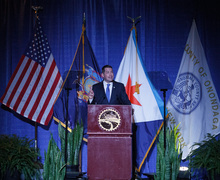Anthony Broadwater’s wrongful rape conviction shows need for justice system reform
Charlotte Little | Staff Photographer
Outdated tactics used in Anthony Broadwater's trial against Alice Sebold led to him spending 16 years in prison for a crime he didn’t commit.
Editor’s Note: This story contains mentions of rape.
In May of 1982, Anthony Broadwater was wrongfully convicted of raping Alice Sebold, then a freshman at Syracuse University. Anthony Broadwater was exonerated from any wrongdoing in his prior conviction 40 years later. While Broadwater spent 16 years in prison, Sebold became a bestselling author, selling over one million copies of her memoir “Lucky,” which recounts her experience of the sexual assault in Thornden Park.
Broadwater’s wrongful conviction is unfortunately not surprising given the racial disparities in the criminal justice system and the impact this has had on Black people in America. While the Black community makes up approximately 15% of the population in New York state, nearly 50% of the people imprisoned in New York are Black.
After being falsely accused and convicted of raping Sebold, Broadwater spent 16 years in prison and was registered as sex offender up until his exoneration. The pain that the justice system inflicted upon Broadwater’s life is extensive.
He never had children with his wife as he felt that his conviction would have negatively impacted his kids’ lives. The effect this wrongful conviction had on Broadwater’s life is immense, and he is far from alone. Black people made up roughly 47% of the 1,900 exonerations listed in the National Registry of Exonerations as of October 2016. These are just cases that were overturned — wrongful convictions are likely much more frequent than we know.
The justice system bears responsibility for Broadwater’s wrongful conviction. It failed on multiple fronts, through the use of outdated and inaccurate tactics.
In Broadwater’s case, prosecutors presented a microscopic hair analysis test as evidence. In 2015, the FBI admitted there were major flaws with the microscopic hair analysis tests as they contain errors in at least 90% of the reviewed cases.
The conviction also rested upon eyewitness testimony, which is historically inaccurate. On top of this, trauma — such as rape — can play a major role in misidentification because high-stress situations can divert attention away from details so a person can focus on simply surviving. Of course, it is important to believe survivors or sexual assault, but Sebold went through something unfathomable that night, and the justice system was too quick to convict without taking into account the situation she was put in.
Not only did prosecutors rely on Sebold’s testimony, but they also had her identify Broadwater in a lineup, which is the leading cause of wrongful convictions. When she identified the Black man next to Broadwater, whom she said in her memoir looked identical to Broadwater, prosecutors told her the two were friends who appeared in the lineup together to trick her.
Now, 40 years after the conviction, Broadwater has been given nothing but an apology and Sebold is without closure. The justice system has failed them both.
Broadwater was only exonerated after a filmmaker working on an adaptation of Sebold’s “Lucky” noticed discrepancies in the stories. These are the stories that the justice system must have — or should have — looked over hundreds of times, especially since Broadwater was denied parole multiple times and had an appeal rejected in 1984. The justice system was neglectful and did not do its due diligence, wrongfully imprisoning yet another Black person as a result. That is inexcusable.
All of these outdated tactics combined with the racism prevalent in the court systems have led to the unfair imprisonment of thousands of Black people. This is more than just the failure of Onondaga County’s court system, or the failure of one case. This is the failure of a justice system that has not reconciled that it is built upon white supremacy.
Nevertheless, the city of Syracuse has a part to play in amending the lives of falsely imprisoned Black people, but it has not done nearly enough. After having his freedom taken from him at 21 years old, spending 16 years in prison and then struggling to secure employment and educational opportunities because he had to register as a sex offender, Broadwater is now 61 years old and in a “precarious financial and housing situation,” said Sheryl Depker-Barau, who created a GoFundMe to support Broadwater after his exoneration.
Depker-Barau, a friend of the film producer that led to Broadwater’s exoneration, raised over $157,500 through the GoFundMe as of Jan. 14, 2022. It is heartwarming to see people help amend injustices, but it is the government — whose flawed justice system destroyed Broadwater’s life as well as the lives of many others — that should be making reparations.
But New York state does not automatically grant reparations to those it has harmed. Instead, individuals who were wrongfully convicted have to file claims for damages and prove the harm the government did to them.
It is time to change the system and begin to repair the damage done to the lives of those wrongfully convicted, especially Black people, whom the U.S. has and continues to significantly harm. New York state should amend the laws regarding compensation. This case should serve as a wake-up call for Syracuse and the rest of the nation.
Though it may seem impossible to change the justice system, there are steps you can take to help the system correct its wrongdoings and ensure that these same mistakes do not happen again.
New York state Senator Zellnor Myrie and Assemblyman Clyde Vanel proposed a package of three bills to overturn and prevent wrongful convictions. You can push for the support and implementation of these bills.
MORE COVERAGE of Anthony Broadwater’s case:
- Man convicted of raping ‘Lovely Bones’ author Alice Sebold exonerated
- ‘The Lovely Bones’ author Alice Sebold apologizes to man exonerated for her rape
Additionally, you can call on your local and state representatives to advocate for revisiting old cases where microscopic hair analysis and other inaccurate tools played a role in the conviction.
You can also donate to funds like Depker-Barau’s, which support those who have been exonerated by helping them obtain housing, food and other necessities, and encourage your representatives to do the same.
Red Badge Films and Red Hawk Films are helping Broadwater by sharing his story in a documentary entitled “Unlucky,” however, to be unlucky, his false conviction would have had to be rare, an anomaly. But Broadwater shares a story with thousands of other Black men that the justice system has unjustly served.
The Daily Orange Editorial Board serves as the voice of the organization and aims to contribute the perspectives of students to discussions that concern Syracuse University and the greater Syracuse community. The editorial board’s stances are determined by a majority of its members. You can read more about the editorial board here. Are you interested in pitching a topic for the editorial board to discuss? Email opinion@dailyorange.com.
Published on January 15, 2022 at 12:23 am
Contact: opinion@dailyorange.com






